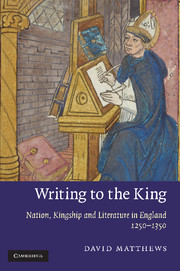Book contents
- Frontmatter
- Contents
- Preface
- Abbreviations
- Introduction
- 1 Defending Anglia
- 2 Attacking Scotland: Edward I and the 1290s
- 3 Regime change
- 4 The destruction of England: crisis and complaint, c.1300–41
- 5 Love letters to Edward III
- Envoy
- Appendix: The tail-rhyme poems of Langtoft's chronicle
- Notes
- Bibliography
- Index
- CAMBRIDGE STUDIES IN MEDIEVAL LITERATURE
3 - Regime change
Published online by Cambridge University Press: 07 May 2010
- Frontmatter
- Contents
- Preface
- Abbreviations
- Introduction
- 1 Defending Anglia
- 2 Attacking Scotland: Edward I and the 1290s
- 3 Regime change
- 4 The destruction of England: crisis and complaint, c.1300–41
- 5 Love letters to Edward III
- Envoy
- Appendix: The tail-rhyme poems of Langtoft's chronicle
- Notes
- Bibliography
- Index
- CAMBRIDGE STUDIES IN MEDIEVAL LITERATURE
Summary
THE KING IS DEAD
According to Jean Froissart, Edward I's dying instruction to his son was that his body should be boiled, the flesh buried and the bones preserved, ‘and that every time the Scots should rebel against him, he would summon his people, and carry with him the bones of his father: for he believed most firmly, that as long as his bones should be carried against the Scots, those Scots would never be victorious’. With hindsight provided by Ernst Kantorowicz, Edward would seem to be guilty of confusing the durability of the king's body mystical with the perishable body natural, or hubristically imagining that his own body natural could partake of the undying character of the mystical body. Froissart, with the hindsight of a few decades, told this probably apocryphal story to underline his broad themes of good and bad rule. Edward II's twenty–year reign, already legendarily bad when Froissart wrote, was the necessary launching point for one of the chronicler's main tasks, the praise of the reign of his successor, Edward III. Edward II's failure to carry out his father's wish, breaking his oath, was in Froissart's scheme a neat aetiology for the many unfortunate things that were to befall him.
As we saw in chapter I, Edward I's succession was surprisingly smooth. But transition from one reign to the next was often traumatic in late medieval England, even when the departure of a given king was regarded as desirable.
- Type
- Chapter
- Information
- Writing to the KingNation, Kingship and Literature in England, 1250–1350, pp. 81 - 107Publisher: Cambridge University PressPrint publication year: 2010



